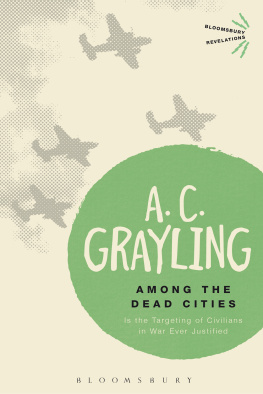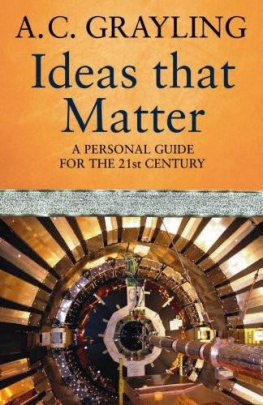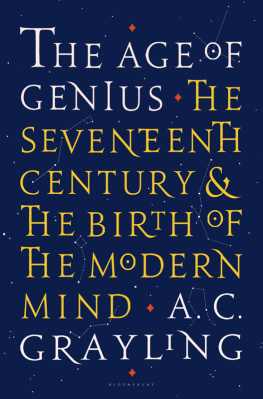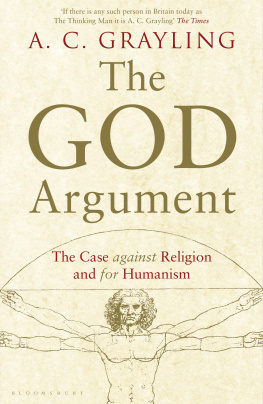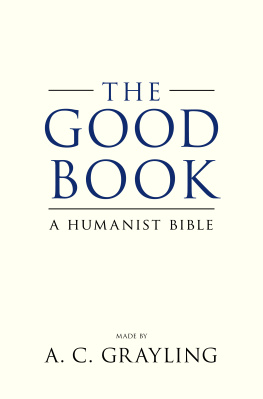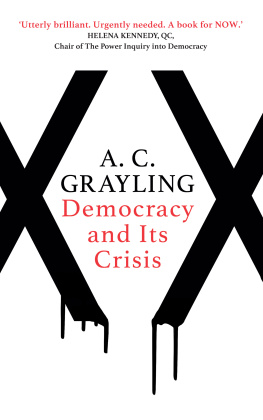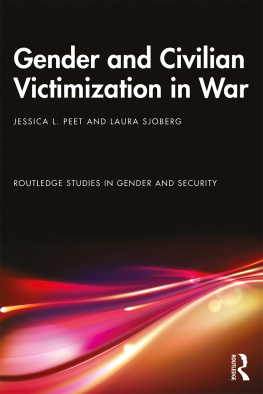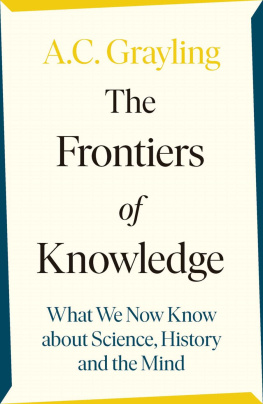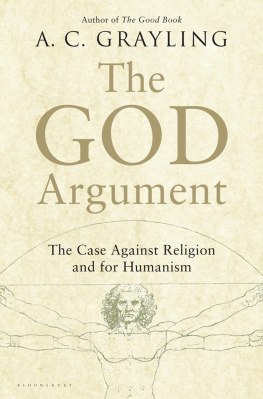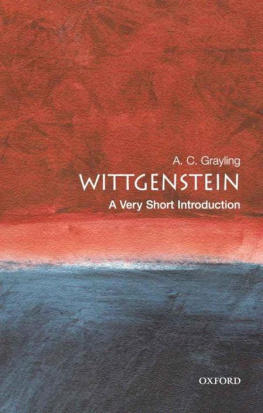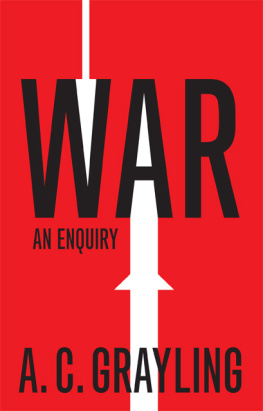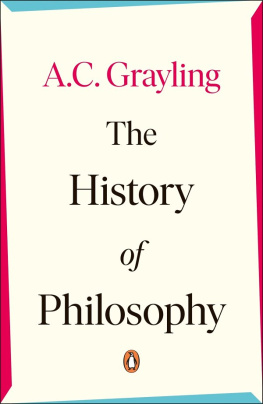A. C. Grayling - Among the Dead Cities: Is the Targeting of Civilians in War Ever Justified?
Here you can read online A. C. Grayling - Among the Dead Cities: Is the Targeting of Civilians in War Ever Justified? full text of the book (entire story) in english for free. Download pdf and epub, get meaning, cover and reviews about this ebook. year: 2014, publisher: A&C Black, genre: History. Description of the work, (preface) as well as reviews are available. Best literature library LitArk.com created for fans of good reading and offers a wide selection of genres:
Romance novel
Science fiction
Adventure
Detective
Science
History
Home and family
Prose
Art
Politics
Computer
Non-fiction
Religion
Business
Children
Humor
Choose a favorite category and find really read worthwhile books. Enjoy immersion in the world of imagination, feel the emotions of the characters or learn something new for yourself, make an fascinating discovery.
- Book:Among the Dead Cities: Is the Targeting of Civilians in War Ever Justified?
- Author:
- Publisher:A&C Black
- Genre:
- Year:2014
- Rating:5 / 5
- Favourites:Add to favourites
- Your mark:
- 100
- 1
- 2
- 3
- 4
- 5
Among the Dead Cities: Is the Targeting of Civilians in War Ever Justified?: summary, description and annotation
We offer to read an annotation, description, summary or preface (depends on what the author of the book "Among the Dead Cities: Is the Targeting of Civilians in War Ever Justified?" wrote himself). If you haven't found the necessary information about the book — write in the comments, we will try to find it.
Among the Dead Cities: Is the Targeting of Civilians in War Ever Justified? — read online for free the complete book (whole text) full work
Below is the text of the book, divided by pages. System saving the place of the last page read, allows you to conveniently read the book "Among the Dead Cities: Is the Targeting of Civilians in War Ever Justified?" online for free, without having to search again every time where you left off. Put a bookmark, and you can go to the page where you finished reading at any time.
Font size:
Interval:
Bookmark:
Among the Dead Cities
For
Madeleine Grayling,
Luke Owen Edmunds,
Sebastian, Thomas, Nicholas and Benjamin Hickman
and Flora Zeman
who are our future
and need us to do justice in all things.
TITLES IN THE BLOOMSBURY REVELATIONS SERIES
Towards the Light , A. C. Grayling
The Oresteia , Aeschylus
Aesthetic Theory , Theodor W. Adorno
Being and Event , Alain Badiou
On Religion , Karl Barth
The Language of Fashion , Roland Barthes
The Intelligence of Evil , Jean Baudrillard
Key Writings , Henri Bergson
I and Thou , Martin Buber
Never Give In!, Winston Churchill
The Boer War , Winston Churchill
The Second World War , Winston Churchill
In Defence of Politics , Bernard Crick
Intensive Science and Virtual Philosophy , Manuel DeLanda
Cinema I , Gilles Deleuze
Cinema II , Gilles Deleuze
A Thousand Plateaus , Gilles Deleuze and Flix Guattari
Anti-Oedipus , Gilles Deleuze and Flix Guattari
Origins of Analytical Philosophy , Michael Dummett
Taking Rights Seriously , Ronald Dworkin
Discourse on Free Will , Desiderius Erasmus and Martin Luther
Education for Critical Consciousness , Paulo Freire
Pedagogy of Hope , Paulo Freire
Marxs Concept of Man , Erich Fromm
To Have or To Be? , Erich Fromm
Truth and Method , Hans Georg Gadamer
All Men Are Brothers , Mohandas K. Gandhi
Violence and the Sacred , Ren Girard
The Three Ecologies , Flix Guattari
The Essence of Truth , Martin Heidegger
The Odyssey , Homer
The Eclipse of Reason , Max Horkheimer
Language of the Third Reich , Victor Klemperer
Rhythmanalysis , Henri Lefebvre
After Virtue , Alasdair MacIntyre
Time for Revolution , Antonio Negri
Politics of Aesthetics , Jacques Rancire
On Late Style , Edward Said
Course in General Linguistics , Ferdinand de Saussure
An Actor Prepares , Constantin Stanislavski
Building A Character , Constantin Stanislavski
Creating A Role , Constantin Stanislavski
Interrogating the Real , Slavoj iek
Some titles are not available in North America.
Among the Dead Cities
Is the Targeting of Civilians in War Ever Justified?
A. C. Grayling

The term war crimes... includes... murder, extermination, enslavement, deportation and other inhumane acts committed against any civilian population before or during the war.
US State Department to the British Ambassador in Washington, 18 October 1945
Contents
Looking back from the safe distance of long hindsight on the Second World Wars aerial bombing campaigns, it is easy to merge them into the general catastrophe of the war, across which lies the black shadow of that staggering crime, the Holocaust. This makes the question of the bombing war less salient than it might otherwise have been, for if there had been a full debate about it in the immediate aftermath of the war, conclusions about its moral status might have had an earlier impact on practice in subsequent conflicts.
Nevertheless everyone with a particular interest in the bombing campaigns of 193945 is aware that there is a large ethical question mark hovering over them. Yet it is difficult to identify historians of the bombing war prepared to venture an unequivocal judgement on this point. Even the supreme historian of this subject, Richard Overy, whose The Bombing War: 19391945 (London, 2013) is the definitive investigation of the relevant archival and statistical details relating to the European theatre, places more emphasis on the fact that bombing was a wasteful and too often ineffective tool than on what is relevant to us today in reflecting on it, which is that we need a clear outcome from a moral audit of one main aspect of it, namely, the years-long campaign of indiscriminate massive aerial bombardment of civilian populations.
That this strategy was immoral is no longer a matter of contention. When the 1949 Fourth Geneva Convention was being drafted, a clause outlawing such attacks was proposed, but the British and US governments rejected it. In 1977 two Protocols were added to the Fourth Convention, one of them outlawing indiscriminate bombing attacks on civilian populations; the UK signed it, the USA to date has not. The question of the morality of this strategy remains a live one therefore, and addressing it seems to me an even more important task than judging whether the economic and manpower effects of the strategy were helpful in the circumstances of the time.
In the body of this book I make the following points very clear: that the primary obligation of the Allied Powers was to defeat Nazism and Japanese militarism, and that the war against the Axis Powers was overwhelmingly justified; but that these facts do not excuse everything done by the Allies in their conduct of the war. I also make it very clear that the moral questionability of indiscriminate bombing of civilians is a matter separate from the courage and sacrifice of the officers and men of the bomber forces, for whom I have the greatest respect. When the memorial to Bomber Command was opened in Green Park, London, in 2013, commemorating the 55,500 men killed in the course of the bombing campaigns, I welcomed it; the tribute is to all the victims, among whom the young air crews themselves number.
Saying this has not prevented some veterans of the bombing war from being bitter in their response to this book, thinking that if we condemn the strategy we thereby impugn the sacrifice they and especially their dead comrades made. But it is important to keep these matters apart. We must learn from the past; that is one of the chief reasons for studying the past. Yet we only learn from the past if we confront its realities, which means accepting the bleak, horrible, violent facts of the bombing war, and putting them into connection with the aims of those in charge of the strategy, and with the effects of its conduct.
Richard Overys conclusions about the relative wastefulness and ineffectiveness of the bombing strategy echo my own here, though in the introductory matter to his book he in effect argues that this fact is not directly relevant to the question of the morality of the strategy. I agree: in the pages that follow I argue that even if the strategy had been more effective in interdicting or redirecting resources from Axis war efforts, it would not have made the relevant aspect of the bombing strategy any more acceptable from the moral point of view. It is heartening to think that there were people in Britain during the war themselves subjected to bombing attacks in 19401 and missile attacks in 1944 who thought likewise, and even in the midst of that time of danger campaigned to stop it.
It is in the footsteps of those isolated wartime anti-bombing voices that I follow here. There are historians of the war and the bombing campaigns Richard Overy has already been mentioned; Sir Max Hastings, Sebastian Cox, David MacIsaac, the RAFs official historians Sir Charles Webster and Noble Frankland, and a number of others, have all focused on the bomber war itself who write very particularly as historians, not as philosophers interested in the lessons to be learned from history. That is the difference between their contributions and this one. It is with due deference to their distinguished books that I lay claim to a place for a book like this alongside theirs.
Nothing substitutes for a close view of what bombing actually meant, how it was carried out, and what effects it had, in coming to understand why our efforts against the harms of war should vigorously target the too-great acceptability of what is now called collateral damage, a phrase coyly masking the maiming and killing of non-combatant women, children and elderly folk, together with the destruction of such cultural resources as schools, hospitals, libraries and art galleries, all needed for the peace that must always at some point follow strife. If the following book has a single purpose, it is to contribute to tearing away the mask drawn over the true effects of bombs and missiles on the bystanders of conflict who in the Second World War, by the Luftwaffe, by the RAFs Bomber Command in Europe, and by the USAAF in Japan, were put directly on the front line and killed in their hundreds of thousands. A frank examination of that history is a contribution to the future; that is what is attempted here.
Next pageFont size:
Interval:
Bookmark:
Similar books «Among the Dead Cities: Is the Targeting of Civilians in War Ever Justified?»
Look at similar books to Among the Dead Cities: Is the Targeting of Civilians in War Ever Justified?. We have selected literature similar in name and meaning in the hope of providing readers with more options to find new, interesting, not yet read works.
Discussion, reviews of the book Among the Dead Cities: Is the Targeting of Civilians in War Ever Justified? and just readers' own opinions. Leave your comments, write what you think about the work, its meaning or the main characters. Specify what exactly you liked and what you didn't like, and why you think so.

